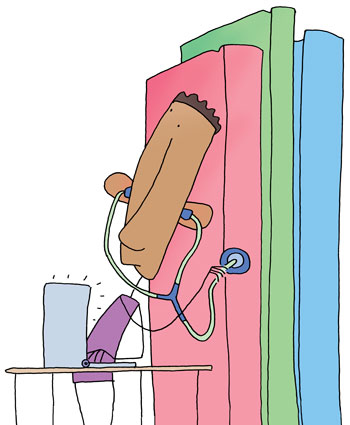Warm-Up for Literary Analyses
What is the purpose of literature? That’s a BIG question. The ancient Roman poet Horace answered it in simple but powerful terms. He said literature should “instruct and delight.” Centuries later, novelists, poets, teachers, and scholars still invoke Horace’s words when creating and studying literature.
The feeling of delight is obvious when you get lost in a really good book. However, the instructional value of a story or poem is not always immediately evident. You have to read closely and critically to discover teachable moments. This is the main challenge of writing a literary analysis.
What Is a Literary Analysis?

Listen to "What Is a Literary Analysis?"
Hide audio
In a literary analysis, you explore one or more important features in a piece of literature. For example, you could trace how the main character changes in a story, or you could discuss how a theme develops. Analyses usually deal with the main elements of literature—plot, character, setting, and theme.
The lessons in this unit will help you learn from and delight in a book of your choosing. Your goal is to share something important that you have learned through your reading and analyzing. You should base the ideas in your analysis on specific evidence from the text. You will likely need to reread portions of the text to focus your ideas. Then you will present the results of your work in a carefully planned essay.
Thinking About Conflict
Let's face it: conflict is compelling . . . and not just the physical variety. Battling and defeating thoughts and feelings can be just as dramatic as fighting a group of ninjas. In literature, conflict fuels the drama, excitement, and suspense that make readers want to keep on reading.
Characters in literature tend to face both internal and external conflicts. On a micro level, characters commonly face at least one of these five types of literary conflict:
- Character vs. Self
- Character vs. Character
- Character vs. Society
- Character vs. Nature
- Character vs. Fate/Supernatural
Cody wants to try out for the school musical but worries that he’s not talented enough and that joining the musical might hurt his reputation. Cody battles with himself about whether or not to try out.
Cody decides to try out. He faces off with Phil for a role. Cody and Phil are in conflict with each other.
When Cody joins the musical, his friends on the basketball team shut him out, while the regular theater kids shun him for being a jock. Cody is in conflict with the social stereotype that athletes can’t be artistic.
During rehearsal, a tornado rips through the town. The cast members have to take shelter in the basement, while the auditorium is destroyed. Nature conflicts with Cody’s aspirations.
Ghosts of performances past appear to Cody, chanting, “The show must go on! The show must go on!” The supernatural creates a new set of obstacles.